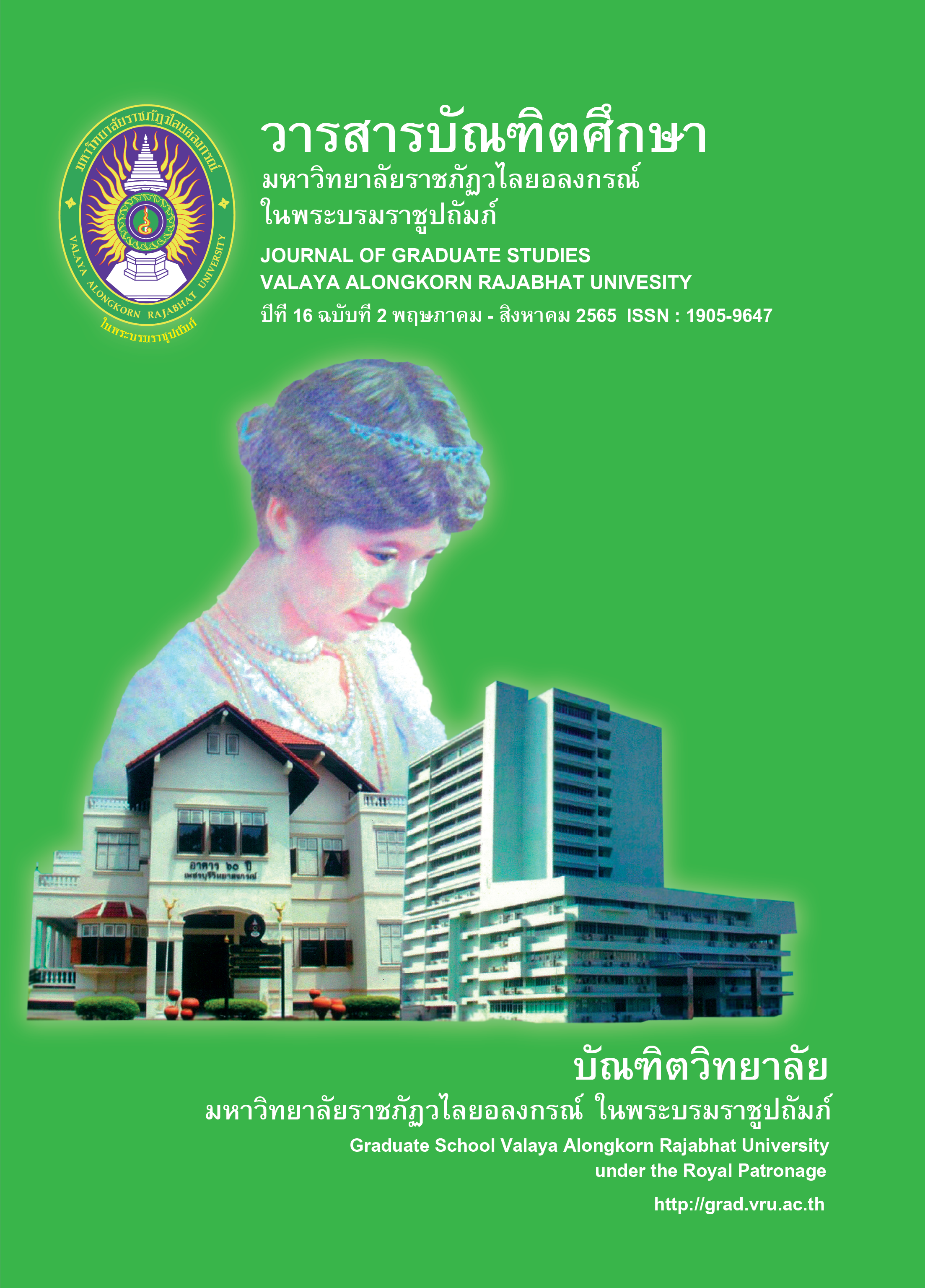THE INFLUENCE OF MOTIVATION, SOCIAL MEDIA USE, POLITICAL DISCUSSION, POLITICAL KNOWLEDGE AND POLITICAL EFFICACY ON POLITICAL PARTICIPATION OF PEOPLE IN THAILAND
Main Article Content
Abstract
This research aimed to study: 1) the influence of motivation on social media use, 2) the influence of political discussion on political knowledge, 3) the influence of political efficacy on political participation, and 4) the influence of motivation, social media use, political discussion, political knowledge, and political efficacy on political participation. This research was quantitative research using a survey questionnaire.
The data was collected from Thais social media users who used social media to follow and to search for various types of political news and to participate in politics. There are 400 participants in this study. The statistics used for data analysis were frequency distribution, percentage, mean, standard deviation, multiple regression analysis and hierarchical regression analysis.
The results showed that: 1) the surveillance and utility motivation positively predicted social media use. 2) Political discussion did not predict political knowledge. 3) Internal political efficacy positively predicted offline political participation, whereas internal and external political efficacy positively predicted online political participation. 4) Internal political efficacy positively predicted offline political participation the most, nevertheless the surveillance motivation negatively predicted offline political participation the most. Lastly, internal political efficacy positively predicted online political participation the most.
Article Details

This work is licensed under a Creative Commons Attribution-NonCommercial-NoDerivatives 4.0 International License.
บทความทุกเรื่องได้รับการตรวจความถูกต้องทางวิชาการโดยผู้ทรงคุณวุฒิ ทรรศนะและข้อคิดเห็นในบทความ Journal of Global of Perspectives in Humanities and Social Sciences (J-GPHSS) มิใช่เป็นทรรศนะและความคิดของผู้จัดทำจึงมิใช่ความรับผิดชอบของบัณฑิตวิทยาลัย มหาวิทยาลัยราชภัฏวไลยอลงกรณ์ ในพระบรมราชูปถัมภ์ กองบรรณาธิการไม่สงวนสิทธิ์การคัดลอก แต่ให้อ้างอิงแหล่งที่มา
References
Campbell, A., Gurin, G., & Miller, W. E. (1954). The voter decides. Evanston. IL: Row, Peterson.
Chen, Z., MPhil, & Chan, M. (2017). Motivations for Social Media Use and Impact on Political Participation in China: A Cognitive and Communication Mediation Approach. Cyber Psychology, Behavior & Social Networking. 20(2), 83-90.
Cho, et al. (2009). Campaigns, reflection, and deliberation: Advancing an O–S–R–O–R model of communication effects. Communication Theory. 19(1), 66–88.
Jung, N., Kim, Y., & Gil de Zuniga, H. (2011). The mediating role of knowledge and efficacy in the effects of communication on political participation. Mass Communication and Society. 14(4), 407-430.
Katz, E., Blumler, J. G., & Gurevitch, M. (1974). Utilization of mass communication by the individual. In J. G. Blumler & E. Katz (Eds.), The uses of mass communications: Current perspectives on gratifications research (pp. 19–32). Beverly Hills CA: Sage.
Lazasfeld, P. F., Berelson, B., & Gaudet, H. (1968). The People’s choice: How the voter makes up his mind in a presidential campaign. 3rd ed. New York: Columbia University Press.
Marketingoops. (2019). chamlæ konlayut chai sư̄ lư̄aktang hoksipsō̜ng phakkānmư̄ang hǣ chai khō̜nthēn + sō chīa lamī dīa sāngsāwok [Dissecting tactics using electoral media '62, political parties parade to use 'content + social media' to create followers]. Retrieved form https://www.marketingoops.com/reports/media-stat/content-and-social-media-strategy-thailand-general-election-2019/
Matichononline. (2018). sīang run mai thī yang mai khœ̄i lư̄aktang mī kwā hā lān khon [New Voter of generation 'Never been elected' with over 5 million people]. Retrieved form https://www.matichon.co.th/politics/news_941410
McLeod, D. M., Kosicki, G. M., & McLeod, J. M. (2010). Political Communication Effects. In Bryant, J., & Oliver, B. M. (Eds.), Media Effects Advances in Theory and Research. 3rd ed. (pp.238-251). New York: Routledge.
Muñiz, C., Téllez, N. M., & Saldierna, A. R. (2017). Political sophisitcation as a mediator in the relation between media consumption and citizen participation. Evidence from the O-S-R-O-R model. Communication & Society. 30(3), 255-274.
Palmgreen, P. (1984). Uses and gratifications: A theoretical perspective. Communication Yearbook, 8, 20–55.
Palmgreen, P., Wenner, L. A., & Rosengren, K. E. (1985). Uses and gratifications research: The past ten years. In K. E. Rosengren,
L. A. Wenner, & P. Palmgreen (Eds.), Media gratifications research: Current perspectives (pp. 11–37). Beverly Hills CA: Sage.
Panthanuwong, A. (2017). sư̄ sangkhom ʻō̜nlaifētbuk læ thawittœ̄ kap khwām sončhai khwām phūkphan læ kānmī sūanrūam thāngkān mư̄ang [Social Media, Facebook and Twitter with interests, engagement and political participation]. Journal of Communication Arts. 35(3), 78-93.
Park, C. S. (2015). Pathways to Expressive and Collective Participation: Usage Patterns, Political Efficacy, and Political Participation in Social Networking Sites. Journal of Broadcasting & Electronic Media. 59(4), 698–716.
Park, C. S. (2017). Do Social Media Facilitate Political Learning? Social Media Use for News, Reasoning and Political Knowledge. The Journal of Social Media in Society. 6(2), 206-238.
Perloff, R. M. (2014). The Dynamics of Political Communication Media and Politics in a Digital Age. New York: Routledge.
Pornsakulvanich, V. (2018). sư̄ mai læ kānčhatkān kānsư̄sān [New media and communication management]. Bangkok: Thammasat University Press.
Rubin, A. M. (2002). The uses-and-gratifications perspective of media effects. In J. Bryant & D. Zillmann (Eds.), Media effects: Advances in theory and research. 2nd ed. (pp. 525–548). Mahwah, NJ: Erlbaum.
The Secretariat of House of Representatives. (2018). kānmī sūanrūam thāngkān mư̄ang nai rabō̜p prachāthipatai [Political participation in democracy]. Bangkok: Publishing house The Secretariat of House of Representatives.
Yamane, T. (1967). Statistics; an introductory analysis. 2nd ed. New York: Harper and Row.
Yanjinda, M., & Cheyjunya, P. (2015). kānraprū khāosān kīeokap kānlư̄ak tang phān sư̄ sangkhom ʻō̜nlai kap thatsanakhati læ phrưttikam kānmī sūanrūam thāngkān mư̄ang khō̜ng prachāchon nai khēt Krung Thēp Mahā Nakhō̜n [Information perception concerning the election through social media on the attitudes and behaviors of political participation of citizens in Bangkok]. In kān prachum wichākān radap chāt pračham pī sō̜ngphanhārō̜ihāsippǣt khana nithētsāt læ nawattakam kānčhatkān sathāban bandit phatthana bō̜rihān sāt (kao Mithunāyon 2558) [National Academic Conference 2015, Graduate School of Communication Arts and Management Innovation National Institute of Development Administration (9 June 2015)] (pp. 2-62-2-77). Bangkok: National Institute of Development Administration.


